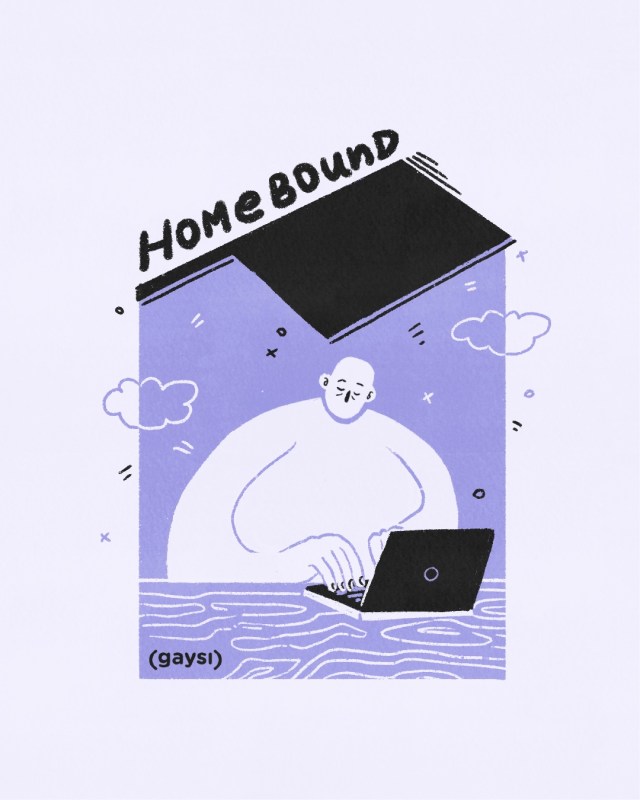In the process of moving from the office to home, a common narrative that disabled people have had to deal with for years has emerged: working from bed is lazy. This is based on the ableist notion that work requires mobility and that real work is accomplished through toil and effort.

What does a day in the life of someone living with chronic physical and mental illness who works from home look like? Most days, all work happens from bed. The bed is then transformed into an office. For those of us who wish to compartmentalize our spaces, we drag ourselves to the desk. We perform the labour our sick and fatigued bodies allow us to do, and most days it needs that extra push. The day drags on: the coffee passes the baton to the heating pad which then passes it to the quick afternoon nap. When the race is complete, retreating back to bed is the grand prize.
For someone who works from home, my days are frequently punctuated by someone telling me how fortunate I am to be making money while “relaxing” at home. In the process of moving from the office to home, a common narrative that disabled people have had to deal with for years has emerged: working from bed is lazy. This is based on the ableist notion that work requires mobility and that real work is accomplished through toil and effort. Additionally, it is conceived on the capitalist principle that each and every interaction, word, physical action, and minute of every day should be focused on achieving both symbolic and material gain. Therefore, work done from home or while in bed is not real work, and if it were, it would not be considered to be valuable work.
As the world opened back up after Covid-19, people rushed to embrace the “new normal”, offices hurried to welcome their colleagues back to the workplace, and companies scrambled to make jobs inaccessible again. People were invited back into the professional workspace and this meant that marginalized folks, disabled and queer people, were once again made to return to the battlefield that they had been given a break from.
Over the past few years, as the pandemic necessitated, work from home became a mandate that many employees benefitted from, especially those who live with disabilities and non-conforming gender and sexual identities. For many people with disabilities, home-based work can be especially beneficial. It can help ensure that pay levels and raises are more based on actual job performance and qualifications rather than stereotypes and workplace cultural dynamics that have been shown to disadvantage workers with disabilities. It can also help ensure job retention. But most importantly, remote work becomes a way for disabled folks to keep working without losing income, especially when surviving in the traditional office space is difficult. Disability also extends beyond the obvious. People with invisible disabilities find it particularly difficult to function in the workplace, in part because society’s understanding of disability is limited and the existence of diverse ways of being disabled is difficult to comprehend. However, with the world going back on-site, disabled people and people living with chronic illnesses have been forced to navigate what the post-pandemic workspace means for them.
The growth of LGBTQ+-friendly online spaces was one result of the rise of social media during the lockdown. People in the queer community were able to establish friendships, learn more about various identities, and find acceptance from both others and themselves thanks to platforms like TikTok, Instagram, and Facebook. Having more space to themselves, allowed members of the LGBTQ+ community to better explore their sexuality and gender identities. However, when one is required to return to their workspaces, these new identities do not translate as easily. Coming out to people at work especially can be a career gamble for some individuals. The workplace can be a significant barrier for those who choose to come out as transgender—using the restrooms, maintaining a gender-affirming appearance, and dealing with coworkers’ reactions can all be difficult to navigate. For non-binary people, navigating pronouns and gender non-conformity in a conventional office setting can also be riddled with emotional labour that can be tiresome. In a conventional office setting, LGBTQ people frequently have a harder time being themselves. Many people have experienced discrimination because of their gender identity or sexual orientation, which can cause feelings of isolation and shame. For those in this circumstance, options are fortunately available. People who work remotely may find it more comfortable to express themselves without worrying about criticism or retaliation. Additionally, there are many workplaces where one’s competence is questioned when it is revealed that one might be queer. For the disabled individual, it’s often the plight of being turned into “inspiration”.
Last month, the Netherlands declared remote work a legal right. This implies that the law forces employers to consider employee requests to work from home as long as their professions allow it. With this, the Netherlands has become one of the first countries to legally allow employees to work remotely. However, it is difficult to take such demands into action without a pinch of salt considering these laws were mainly put in place to safeguard the interests of able-bodied workers, even when disabled folks have been asking for these accommodations for the longest time. Disabled workers now have the option of working remotely from the comfort of their homes, which offers more flexibility, accessibility, savings on travel time and costs, and even the privacy necessary to address medical issues that cannot be handled at work.
For people with disabilities who might find it difficult to travel or visit the office, this is especially crucial. Another aspect of working from home other than the flexibility has been clothing. Within the home, there is no need to follow a particular dress code. Clothing can be extremely important to an individual’s identity and sense of self, especially for those with disabilities and queer people. However, the dress code required for employment in a conventional office setting may not be suitable for your disability. You can dress however you want and feel as comfortable as usual when working from home without having to worry about what people think.
I have ADHD, so even when I crave stillness and quiet, my brain refuses. Some days, I’m more interested in figuring out what that picture in my boss’s background is than what he’s trying to tell me about one of the most important business processes. But my greatest fear was that I would be found when I was in the physical space. Would my colleagues and seniors be less trusting of me because of my neurodiversity? Would admitting to my illness jeopardize my professional credibility? It is also obvious that when I’m sick, both physically and mentally, my work suffers. How can I make accommodations that won’t just help me survive but also succeed? I find it easier to centre myself when I’m at home. I don’t feel isolated. Everything I need to feel affirmed is right here. And many disabled and queer people share this need. This is why working from home is a need. Because for those of us who have to struggle to survive the traditional workplace, it means preservation. It is the required destruction of able-body-centered industry.








